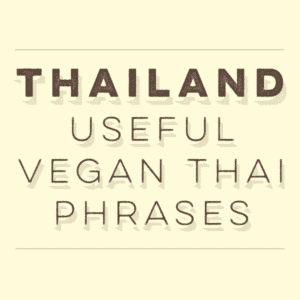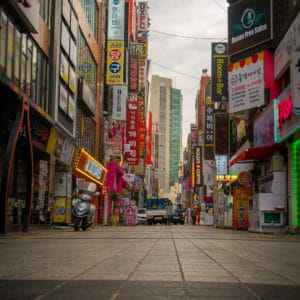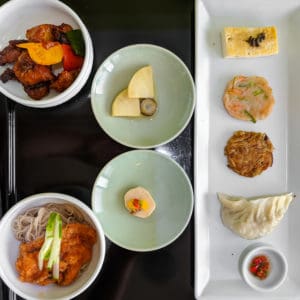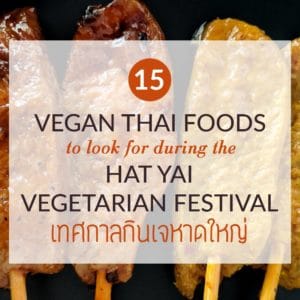With little preparation and knowledge it's easy to feel overwhelmed and unable to request or identify vegan options in Thailand beyond mango sticky rice and spring rolls. Fortunately Thais are well versed in the concept of veganism even if it isn't always referred to as such, and with patience and perseverance Thailand is an endlessly rewarding destination for food-loving vegans.
While I have been visiting Thailand since 2003, it wasn't until I had a few trips under my belt before I learned to navigate the menus and to understand what fell under the umbrella of my dietary choices. Recently I began to study the language, and so my reason for writing this vegan guide to Thai travel is twofold: to explain the Thai notion of veganism and to provide some useful Thai phrases for vegans in Thailand. Since Thai is a tonal language I have also included written translations to show food purveyors in case they can't understand you.
The word jay (imagine someone who is drunk, trying to sound cool while clumsily leaning against a door frame, greeting you “aaaaaaay” – that's the pronunciation of the 'ay' in jay, long and low) translates to a kind of veganism. This diet also forbids some ingredients (including garlic, onion, grachai, and other strong spices), but it almost certainly guarantees a meal free from any animal products (a caveat: honey is allowed, and sometimes oyster sauce is used).
At times the concepts of veganism and vegetarianism are conflated in Thailand, but technically while jay (เจ) Thai food is almost always vegan, vegetarian (mangsawirat or มังสวิรัติ) Thai food may utilise eggs, fish sauce, and/or some other animal derived ingredients. Since most Thai cuisine is unlikely to contain dairy (although I have seen it creeping more into the diet over the past dozen years), milk products are not a major concern but are still allowed in mangsawirat foods.
In more recent times the word vegan has been transliterated to Thai and is more familiar in bigger cities like Bangkok and Chiang Mai. In rural parts of the country, however, you may find more luck sticking with jay as a descriptor of what you eat.
How to ask if food is suitable for vegans and vegetarians in Thailand
First note importance of the gendered polite particles ka and krap, which are appended to sentences in Thai language. If you are a woman, you use ka (sometimes you will hear women also say ha or ja, which is a variant of ka) and if you are a man you use krap (often pronounced more like club or cup). It isn't mandatory to use these words, but it is an indication of politeness in speech.
Do you have any vegan food? (keep in mind vegan as a word is a newer concept in Thailand so if there is confusion you can try the next example)
Mee ahaan weegan mai (ka/krap)?
มีอาหารวีแกนไหม
Do you have any jay food?
Mee ahaan jay mai (ka/krap)?
มีอาหารเจไหม
Do you have any vegetarian food?
Mee ahaan mangsawirat mai (ka/krap)?
มีอาหารมังสวิรัติไหม
Typical responses might be:
No, don't have.
Mai mee (ka/krap)
ไม่มี
No, cannot.
dai mai (ka/krap)
ไม่ได้
Other useful Thai words to know as a vegan in Thailand
ไก่ = gai = chicken
ไข่ = kai = egg
นม / น้ำนม = nam nom (or just nom) = milk
เนย = nooei = butter
เนื้อสัตว์ = nuua sat = meat
เนื้อ = nuua = meat (beef)
หมู = moo = pork
ลูกแกะ = look gae = lamb
กุ้ง = goong = shrimp
กะปิ = gapi = shrimp paste
ปลา = plaa = fish
น้ำปลา = nam plaa = fish sauce
ปลาร้า = plaa raa = fermented fish paste
ซอสหอยนางรม = sot hooi naang rom = oyster sauce
น้ำผึ้ง = nam pung = honey
เจ = jay = vegan (a colour scheme of red text on a yellow background will distinguish signposts)
อาหารเจ = ahaan jay = vegan food
อาหารมังสวิรัติ = ahaan mangsawirat = vegetarian food
อาหารวีแกน or อาหารวีแก้น = ahaan weegan = vegan food (but this is a newer word so use เจ/jay as fallback)
ไม่ใส่ = mai sai (ka/krap) = don't add/put in (e.g. mai sai nam bplaa)
ไม่เอา = mai ao ka/krap = do not want (e.g. mai ao nuua sat)
ใส่ถุง = sai tung = put in a bag (effectively this is a way to order takeaway)
Other tips
Don't lose your temper. Saving face is important in Thai culture, so you will only embarrass yourself, your company, and the proprietor if you lose patience and act out. I have met countless Western vegans in Thailand who spit venom over local vendors for effectively not understanding English and/or their own cultural values. Please, spend your energy elsewhere – berating a human being for not understanding that you don't eat fish sauce makes you look foolish. It's straightforward to communicate veganism in Thailand, so there is no need for drama.
More Resources for Vegan Travel in Thailand
Seven Thai vegan foods to try in Thailand
Traveling Vegan in Thailand
Vegan Bangkok: Malls and Supermarkets
Vegan and Vegetarian Thailand
Some Vegan Bangkok Eats and Treats






Allan Wilson says
I find that "phom kin jay" works well. I'm not vegetarian or vegan but it's always a good way to rid of pushy meat vendors on trains etc.. It must be hard however to avoid fish sauce. The work "khem" means salty so it's a way to avoid it, although mai sai nam pla would probably be easier 🙂
I reserve the right to improve malicious and trollish comments.